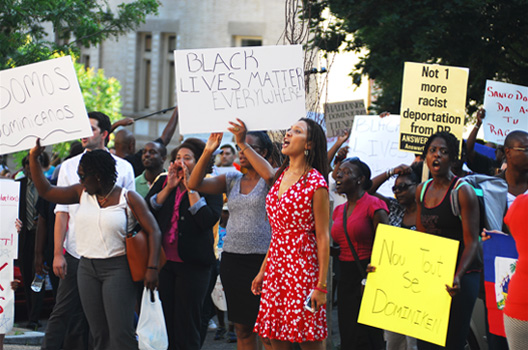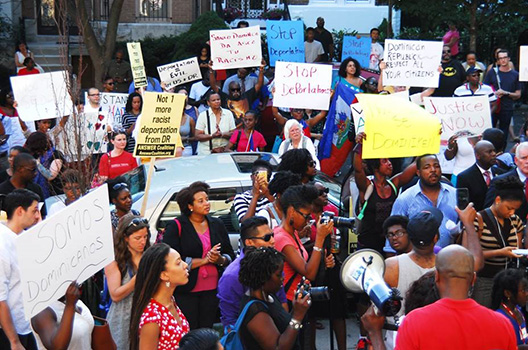 Tensions have flared for decades between the two countries that share the Caribbean island of Hispaniola, but the bitterness has now reached a boiling point with the Dominican Republic’s imminent forcible deportation of up to two hundred thousand stateless people of Haitian descent back over the border to Haiti.
Tensions have flared for decades between the two countries that share the Caribbean island of Hispaniola, but the bitterness has now reached a boiling point with the Dominican Republic’s imminent forcible deportation of up to two hundred thousand stateless people of Haitian descent back over the border to Haiti.
On June 22, more than five hundred Dominicans of Haitian origin and their supporters gathered in front of the Dominican Embassy in Washington, DC, where they shouted slogans through megaphones denouncing the pending deportations and held aloft handmade signs demanding “No More Racist Deportations!” and “Stop Ethnic Cleansing”.
That followed a much larger protest near New York’s Times Square on June 17—the deadline for residents to meet the documentation requirements that would have allowed some Haitians born in the Dominican Republic to obtain legal status there.
“The new law says that if one of your parents is not Dominican, then you no longer qualify for citizenship, and that you now have to reapply to be able to keep your Dominican citizenship,” said Jason Marczak, Deputy Director of the Atlantic Council’s Adrienne Arsht Latin America Center.

After the June 17 deadline passed, the United Nations High Commissioner for Refugees (UNHCR) urged Santo Domingo not to deport the thousands of people who the agency said were arbitrarily deprived of their nationality following a 2013 Dominican court ruling.
“The consequences of their eventual expulsion to Haiti could be devastating,” warned UNHCR Chief Spokesman Adrian Edwards. “UNHCR is concerned both about the human rights considerations for people who may be expelled and that people may end up being pushed into Haiti, even though they are not considered citizens of that country. It is of the utmost importance that the Dominican Republic takes necessary action to prevent any expulsions of stateless individuals and to avoid creating a new refugee situation.”
The issue has put the contrast between the two countries into sharp focus, said Marczak.
“There’s an economic gap between the United States and Mexico, but that pales in comparison to the inequality between the Dominican Republic and Haiti, which is basically a sub-Saharan country stuck in the middle of the Western Hemisphere,” he said. “The Dominicans want nothing to do with them.”
While the populations of both countries is about the same (the Dominican Republic is home to 10.7 million people, Haiti to 10.4 million), the Dominican economy—fueled largely by manufacturing and tourism—is estimated at $61 billion, translating into per-capita GDP of about $5,879. Haiti’s largely agricultural economy, by contrast, is only $8.4 billion, with a per-capita income of just $820.
Likewise, population density is 219 per square kilometer in the Dominican Republic, where average life expectancy is 73.2 years. Compare that with Haiti, where density exceeds 375 people per square kilometer and life expectancy is only 62.7 years.
 Haitian laborer cuts sugarcane near the town of Jacmel. Photo: Larry Luxner
Haitian laborer cuts sugarcane near the town of Jacmel. Photo: Larry Luxner
For years, black Haitians have been crossing the border to work in the Dominican sugar industry, often living in substandard conditions—an exodus that increased after a magnitude-7.0 earthquake devastated Port-au-Prince in January 2010.
“This is the last thing Haiti, still trying to recover five years after the earthquake, needs right now,” said Marczak. “In the United States, we continue to search for a resolution to the millions of undocumented migrants who have been in the country for years. In the Dominican case, we’re not just talking about Haitians who might have moved there in the last five or ten years, but people actually born in the Dominican Republic. A vast number of them have never been to Haiti, and many have spent their whole lives in the Dominican Republic.”
Yet politicians are wary of offending people of either group.
“[New York Mayor] Bill DiBlasio has spoken out against what’s happening in the Dominican Republic, but it’s tough because politicians have to walk a fine line,” he said. “Many have both Dominican and Haitian constituencies.”
In fact, more than 750,000 Dominicans now live in New York City—principally the Bronx and Manhattan’s Washington Heights—and for the first time ever, they outnumber Puerto Ricans.
In November 2013, the Washington Post lashed out in an editorial against the policy, noting the “unconscionable decision by the highest Dominican court that strips at least two hundred thousand ethnic Haitian migrants of any claim to citizenship, including those born on Dominican soil decades ago.” It said the decision—being enforced now—”enshrines the deep-seated racism and discrimination suffered by Haitian migrants and their children, who have worked backbreaking jobs in Dominican sugar-cane fields and construction sites for many years… the implications of the court’s xenophobic ruling are disastrous.”
Marczak spoke to The New Atlanticist’s Larry Luxner on June 22. Here are excerpts from our interview:
Why is this all coming to a head now?
Marczak: These changes came about a couple of years ago, and there’s a lot of built-up popular support for the new laws, probably because there’s deep historical resentment towards the large Haitian population. That’s definitely a huge reason behind this.
The most difficult part is that it’s retroactive. This is being applied retroactively back to 1929. You could be living in the country for eighty years and still be subject to deportation, if you don’t have a parent who was Dominican. That’s why there’s so much international outrage.
Hostilities between Haiti and the Dominican Republic date back to the nineteenth century, and at one time Haiti ruled over the entire island. How much is this a factor in the current debate?
Marczak: There are decades of mistrust between Haitians and Dominicans. After the earthquake, the Dominicans sent in help, some of it for altruistic reasons. But it was also to keep more Haitians from coming. It’s hard to change what’s happening in the Dominican Republic, especially when there’s such large public support for it. There’s never really been recognition of the contributions Haitians have made to the Dominican economy. Their labor is generally unrecognized.
There’s an economic gap between the United States and Mexico, but that pales in comparison to the inequality between the Dominican Republic and Haiti, which is basically a sub-Saharan country stuck in the middle of the Western Hemisphere. The Dominicans want nothing to do with them.
How would such a mass deportation affect the already fragile Haitian economy?
Marczak: This is the last thing Haiti, still trying to recover five years after the earthquake, needs right now. In the United States, we continue to search for a resolution to the millions of undocumented migrants who have been in the country for years. In the Dominican case, we’re not just talking about Haitians who might have moved there in the last five or ten years, but people actually born in the Dominican Republic. A vast number of them have never been to Haiti, and many have spent their whole lives in the Dominican Republic.
How much leverage does the US government have over the Dominican Republic?
Marczak: The United States does have a role to play, insofar as working with Dominican authorities to ensure an orderly implementation of the laws that were passed, and that everybody who needs to reapply can do that. There’s incredible confusion around this process. People don’t know how to reapply.
The United States cannot overturn these laws. In 2010, a new constitution allowed for this to get to the point we’re at right now, and a court upheld the decision. But it can put subtle pressure on the Dominican authorities to very loosely interpret the law, and only act on it in the most extreme circumstances.
Larry Luxner is an editor at the Atlantic Council.
Image: Dominicans of Haitian descent and their supporters protest June 22 in front of the Dominican Embassy in Washington against a plan to deport up to two hundred thousand people over the border to Haiti. Photo: Larry Luxner
